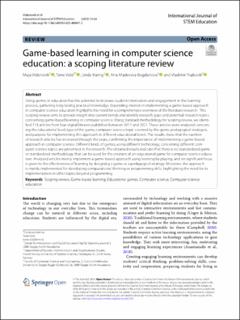Game-based learning in computer science education: a scoping literature review
Peer reviewed, Journal article
Published version
Permanent lenke
https://hdl.handle.net/11250/3087911Utgivelsesdato
2023Metadata
Vis full innførselSamlinger
Originalversjon
https://doi.org/10.1186/s40594-023-00447-2Sammendrag
Using games in education has the potential to increase students’ motivation and engagement in the learning process, gathering long-lasting practical knowledge. Expanding interest in implementing a game-based approach in computer science education highlights the need for a comprehensive overview of the literature research. This scoping review aims to provide insight into current trends and identify research gaps and potential research topics concerning game-based learning in computer science. Using standard methodology for scoping review, we identifed 113 articles from four digital libraries published between 2017 and 2021. Those articles were analyzed concerning the educational level, type of the game, computer science topic covered by the game, pedagogical strategies, and purpose for implementing this approach in diferent educational levels. The results show that the number of research articles has increased through the years, confrming the importance of implementing a game-based approach in computer science. Diferent kinds of games, using diferent technology, concerning diferent computer science topics are presented in the research. The obtained results indicate that there is no standardized game or standardized methodology that can be used for the creation of an educational game for computer science education. Analyzed articles mainly implement a game-based approach using learning by playing, and no signifcant focus is given to the efectiveness of learning by designing a game as a pedagogical strategy. Moreover, the approach is mainly implemented for developing computational thinking or programming skills, highlighting the need for its implementation in other topics beyond programming.

